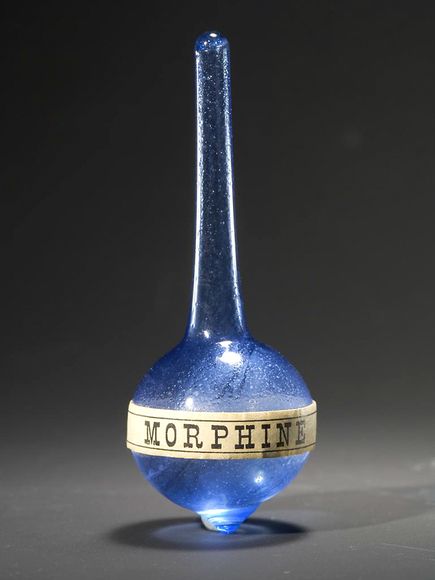A laboratory morphine vial from the 1880s.
Our bodies produce a small but steady amount of natural morphine, a new study suggests.
Traces of the chemical are often found in mouse and human urine, leading scientists to wonder whether the drug is being made naturally or being delivered by something the subjects consumed.
The new research shows that mice produce the “incredible painkiller”—and that humans and other mammals possess the same chemical road map for making it, said study co-author Meinhart Zenk, who studies plant-based pharmaceuticals at the Donald Danforth Plant Science Center in St. Louis, Missouri.
In the study, researchers injected mice with an extra dose of a natural brain chemical called tetrahydropapaveroline (THP), which humans and mice are known to produce.
Using a tool called a mass spectrometer to analyze the mouse urine, the team was able to tell that THP underwent chemical changes in the body that created morphine, according to the study, published this week in the journal Proceedings of the National Academy of Sciences.
What’s more, the study found that mouse morphine is produced in nearly the same way as the morphine in poppies—the only morphine-making plants known to science.
Morphine a Defense Mechanism?
But “the big question is, What is it for?” Zenk said of the mammal-made morphine.
THP must undergo a complicated, 17-step process in the body to create morphine. Even so, the chemical has evolved twice—in poppies and in mammals—suggesting it’s somehow valuable for survival.
In the well-studied poppy plant, scientists suspect morphine acts as a defense against predators. For instance, a rabbit eating—and thus killing—a morphine-laced poppy may become sluggish, making itself easy prey for a passing hawk.
Likewise, Zenk noted, if an animal attacks a person, even background levels of morphine may block out enough pain to allow the person to escape. (Explore the human body.)
For now, however, this is “absolute speculation,” Zenk said. Next he plans to test the urine of people who have endured horrible pain—such as traffic-accident victims—to see if their bodies spiked morphine levels.
It’s also difficult to say whether the discovery will yield any new treatments, Zenk added. (Related: “Toxic Snail Venoms Yielding New Painkillers, Drugs.”)
But it’s possible that scientists could someday induce a person’s body to create a natural jolt of morphine that might prove less damaging than injecting the substance into the body. Morphine shots can carry many side effects, he said—especially constipation.





